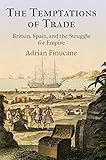The Temptations of Trade : Britain, Spain, and the Struggle for Empire / Adrian Finucane.
Material type: TextSeries: The Early Modern AmericasPublisher: Philadelphia : University of Pennsylvania Press, [2016]Copyright date: ©2016Description: 1 online resource (224 p.) : 5 illusContent type:
TextSeries: The Early Modern AmericasPublisher: Philadelphia : University of Pennsylvania Press, [2016]Copyright date: ©2016Description: 1 online resource (224 p.) : 5 illusContent type: - 9780812248128
- 9780812292756
- 382.0941 23
- HF3505.6 .F56 2016
- online - DeGruyter
- Issued also in print.
| Item type | Current library | Call number | URL | Status | Notes | Barcode | |
|---|---|---|---|---|---|---|---|
 eBook
eBook
|
Biblioteca "Angelicum" Pont. Univ. S.Tommaso d'Aquino Nuvola online | online - DeGruyter (Browse shelf(Opens below)) | Online access | Not for loan (Accesso limitato) | Accesso per gli utenti autorizzati / Access for authorized users | (dgr)9780812292756 |
Frontmatter -- Contents -- Prologue: Before the Asiento -- Chapter 1. Britain Hopes for the "Riches of America," 1713-1716 -- Chapter 2. The Stuttering Success of the Early Trade, 1717-1728 -- Chapter 3. "Unjust Depredations" and Growing Tensions, 1729-1738 -- Chapter 4. The End of the British Asiento, 1739-1748 -- Epilogue: Beyond the Asiento -- List of Abbreviations -- Notes -- Index -- Acknowledgments
restricted access online access with authorization star
http://purl.org/coar/access_right/c_16ec
The British and the Spanish had long been in conflict, often clashing over politics, trade, and religion. But in the early decades of the eighteenth century, these empires signed an asiento agreement granting the British South Sea Company a monopoly on the slave trade in the Spanish Atlantic, opening up a world of uneasy collaboration. British agents of the Company moved to cities in the Caribbean and West Indies, where they braved the unforgiving tropical climate and hostile religious environment in order to trade slaves, manufactured goods, and contraband with Spanish colonists. In the process, British merchants developed relationships with the Spanish-both professional and, at times, personal.The Temptations of Trade traces the development of these complicated relationships in the context of the centuries-long imperial rivalry between Spain and Britain. Many British Merchants, in developing personal ties to the Spanish, were able to collect potentially damaging information about Spanish imperial trade, military defenses, and internal conflict. British agents juggled personal friendships with national affiliation-and, at the same time, developed a network of illicit trade, contraband, and piracy extending beyond the legal reach of the British South Sea Company and often at the Company's direct expense.Ultimately, the very smuggling through which these empires unwittingly supported each other led to the resumption of Anglo-Spanish conflict, as both empires cracked down on the actions of traders within the colonies. The Temptations of Trade reveals the difficulties of colonizing regions far from strict imperial control, where the actions of individuals could both connect empires and drive them to war.
Issued also in print.
Mode of access: Internet via World Wide Web.
In English.
Description based on online resource; title from PDF title page (publisher's Web site, viewed 30. Aug 2021)


